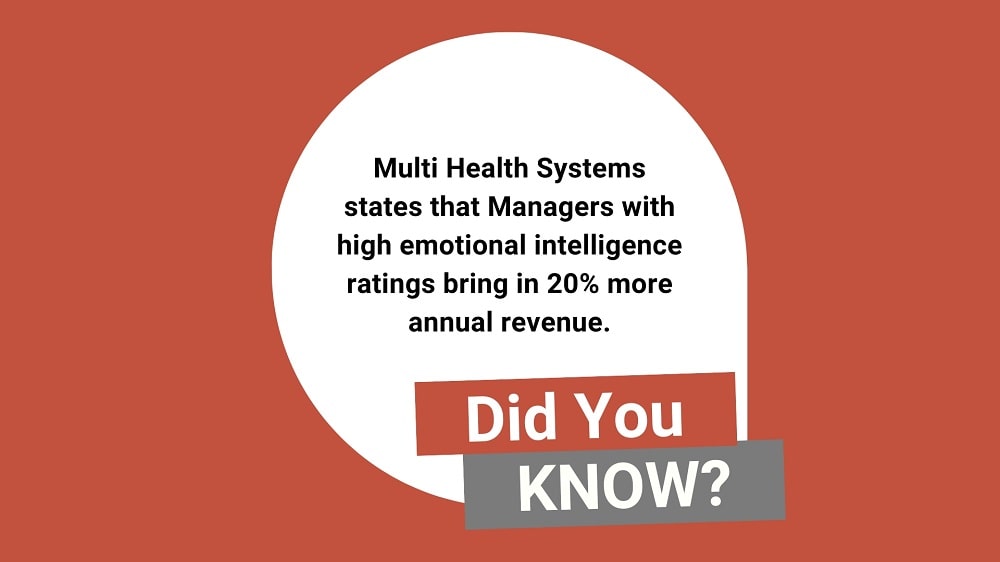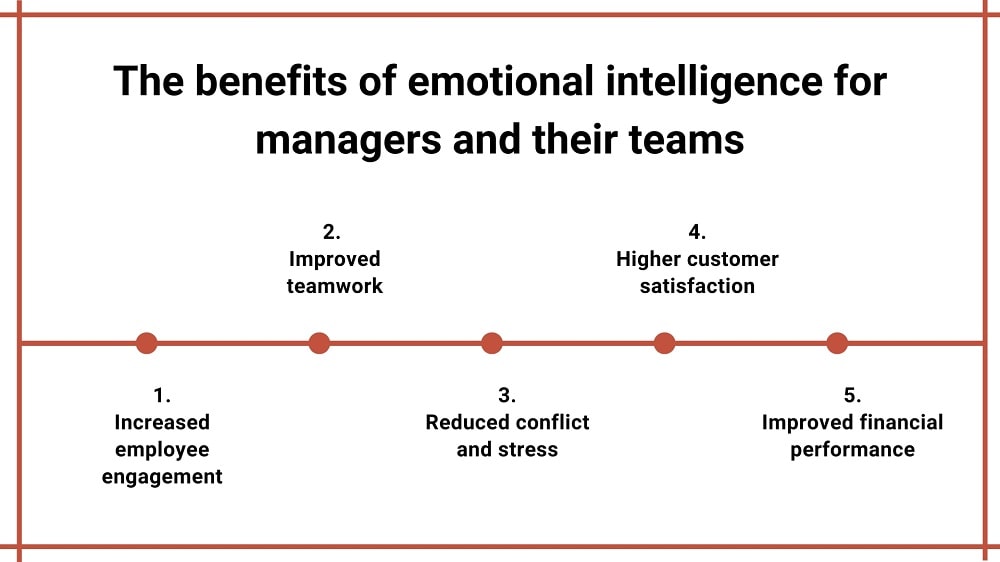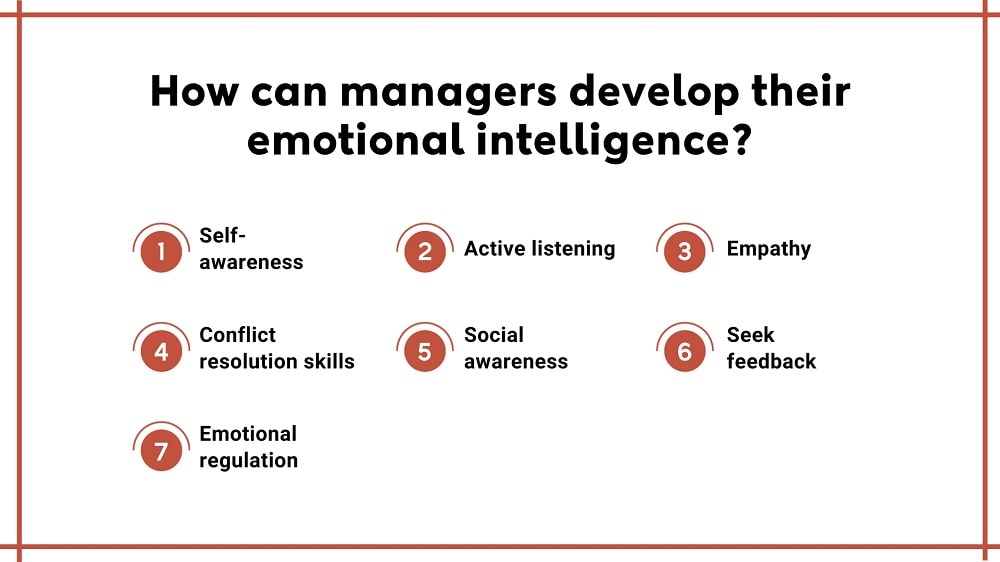Have you ever wondered what makes a manager great?
You see, the skills that helped you to get the first promotion might not be enough for your future success.
If you want to aspire to be in a leadership role, an emotional element is what you need.
It will help you to effectively coach teams, handle stress, provide feedback, and collaborate seamlessly with your colleagues.
It is known as emotional intelligence, abbreviated as EQ, one of the most sought-after interpersonal skills in the workplace.
According to a report by the Robert H. Smith School of Business at the University of Maryland, “71% of hiring managers said having EQ is more important than IQ and 51% of them said that they would NOT hire someone with a high IQ but a low EQ”
In this post, I will talk about emotional intelligence, emphasizing its importance in leadership, and tips to develop emotional intelligence.
What is emotional intelligence?
Emotional intelligence is defined as the ability to recognize, understand, manage, and effectively use our own emotions while also being able to identify the emotions of others.
It helps you to get along with others and succeed in various aspects of life, work, and relationships.
In simple terms, emotional intelligence is being smart with your feelings and how you deal with the feelings of those around you.
Why is emotional intelligence important for managers?
Now that we know what emotional intelligence is, let’s move on to the big question.
Why it is important for managers?
Emotional intelligence fosters effective communication and interpersonal relationships. A manager with high EQ can inspire team members to perform at their best.
Managers often face difficult decisions. EQ helps them to weigh emotional factors, making well-rounded choices that consider the feelings and perspectives of team members.
Strong EQ can help managers mediate conflicts efficiently, find common ground, and maintain team harmony.
Managers with EQ have empathy, which enables them to connect with the team on a deeper level. Team members feel valued and heard when their managers understand their emotions and concerns.
High EQ makes managers more adaptable and guides their teams through change with grace and composure.
Check out 9 Proven Strategies to maintain work-life balance!
How does emotional intelligence impact the workplace?

In a report, Multi-Health Systems states that Managers with high emotional intelligence ratings bring in 20% more annual revenue.
Emotional intelligence affects more than just an individual manager’s abilities. It also influences how the workplace functions and the overall environment.
Managers with high EQ have more engaged and productive teams, resulting in lower turnover rates and higher customer satisfaction levels.
The benefits of emotional intelligence for managers and their teams

Here are some benefits a manager and his team can enjoy from focusing on emotional intelligence:
- Increased employee engagement and productivity
When employees feel appreciated and understood, they are more likely to be motivated and engaged in their work.
Managers who have high emotional intelligence can create a positive work environment that promotes productivity.
- Improved teamwork and collaboration
Teams led by emotionally intelligent managers tend to work together more effectively.
These managers can bridge gaps, build trust, and encourage effective collaboration among team members.
- Reduced conflict and stress
Emotional intelligence helps managers handle conflicts and stressful situations in a way that reduces tension in the workplace and improves employee well-being.
- Higher customer satisfaction
Satisfied and motivated employees are more likely to provide excellent customer service.
Managers with high EQ can inspire their teams to offer outstanding customer experiences.
- Improved financial performance
Research shows that companies with emotionally intelligent leaders usually have higher profitability and growth.
EQ helps with better decision-making and employee retention, resulting in a positive impact on the bottom line.
How can managers develop their emotional intelligence?
You might be wondering if emotional intelligence is something you can improve.
The answer is definitely yes!

Here are some helpful strategies to enhance your EQ:
- Self-awareness
Start by understanding your own emotions.
Self-awareness is achieved by reflecting on your emotions and recognizing your triggers. It helps you manage them better.
- Active listening
Practice active listening to understand the emotions of others.
Pay attention to both verbal and non-verbal cues, and ask clarifying questions to ensure you grasp their perspectives accurately.
- Empathy
A new study of 889 employees by Catalyst found that 76% of people feel engaged when their leaders show empathy towards them.
Put yourself in others’ shoes to develop empathy.
Try to understand their feelings, needs, and concerns. Empathy builds stronger relationships and trust.
- Conflict resolution skills
Learn effective conflict resolution techniques.
These skills enable you to navigate conflicts and reach resolutions that satisfy all parties involved.
- Social awareness
Improve your ability to read the room and the emotions of your team.
Being attuned to the collective mood helps you adapt your leadership style accordingly.
- Seek feedback
Ask for feedback from your team and colleagues.
Constructive feedback can provide valuable insights into areas where you can enhance your emotional intelligence.
- Emotional regulation
Practice regulating your emotions, especially in high-pressure situations.
Techniques like deep breathing and mindfulness can be incredibly helpful.
Conclusion
Managers set the tone of their organization. Managers with high EQ are able to build relationships, motivate their teams, and manage conflicts effectively. But if you lack EQ, it could have consequences, leading to lower employee engagement and a high turnover rate.
So, remember, it’s not just about what you know or what skills you have; it’s also about how you feel and how you make others feel. Emotional intelligence can help you progress in your career and benefit your company.
FAQs about emotional intelligence
What are the components of emotional intelligence?
EQ comprises 4 core components, including self-awareness, self-management, social awareness, and relationship management.
How to identify a lack of emotional intelligence?
Common indicators of low emotional intelligence are difficulty managing and expressing emotions, understanding other’s perspectives, and poor communication skills.
How can organizations promote emotional intelligence?
Organizations can promote EQ by providing employees with training and development programs and providing opportunities to practice and enhance their emotional intelligence skills.
How to measure emotional intelligence?
There are different assessments and tests available, such as Emotional Intelligence Appraisal and EQ-i 2.0, which can measure an individual’s EQ. These tests evaluate different components of EQ to give a comprehensive result.
What are the common challenges manager face in developing their emotional intelligence?
Challenges that a manager faces include resistance to change, lack of self-awareness, time constraints, and the need for ongoing practice and self-improvement.
What is the difference between emotional intelligence and IQ?
Emotional intelligence is the ability to understand and manage your own emotions, as well as the emotions of others. IQ is a measure of your cognitive abilities, such as your ability to reason and solve problems.
How does emotional intelligence contribute to mental health?
Emotional intelligence can contribute to better mental health by enabling individuals to cope with stress, manage emotions effectively, and build strong, supportive relationships.




















No Comments